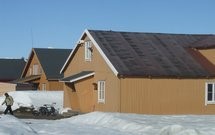 India’s efforts to keep up with China and gain a strong foothold in the resource-rich Arctic region got a boost on Wednesday, when the Arctic Council was expanded to include six new nations, including India, as observer states. It is the first time Asian countries have been granted observer status.
India’s efforts to keep up with China and gain a strong foothold in the resource-rich Arctic region got a boost on Wednesday, when the Arctic Council was expanded to include six new nations, including India, as observer states. It is the first time Asian countries have been granted observer status.
“Welcome China, India, Italy, Japan, Republic of Korea and Singapore as new Observer States, and take note of the adoption by Senior Arctic Officials of an Observer manual to guide the Council’s subsidiary bodies in relation to meeting logistics and the roles played by Observers,” the Kiruna Declaration said.
The Arctic Council, created in 1996, coordinates policy in the region and oversees the fragile ecosystem of the area. The Council is comprised of the eight Arctic nations: Canada, Denmark, Finland, Iceland, Norway, Russia, Sweden and the United States, all of whom agreed to the grant of special Observer status to China, Japan, South Korea, India, Singapore and Italy. The Council has acted as a watchdog for the rights of the region's indigenous people and protector of its fragile ecosystem. The inclusion of observer states to the council came after an intense debate at the council’s biennial meeting in Kiruna, Sweden, in which US Secretary of State John Kerry also participated.
For the new entrants, other than the huge prospects for research, major incentives include oil and gas exploration, formulation of new trade routes and an opportunity to explore the enormous resources of the area.
India has had its own research station at the Arctic, 'Himadri', since 2008, when it was inaugurated by then Union Science and Technology Minister Kapil Sibal. Equipped with state-of-the-art facilities for year-round scientific work, the station is located at Ny-Alesund in Norway, which is the northern-most permanent human settlement, 1,200 km from the North Pole.
With Himadri, India is the 11th country to have established a full-fledged research station at the Arctic. The others are Britain, Germany, France, Italy, China, Japan, South Korea, The Netherlands, Sweden and Norway.
India also has a permanent research station in Antarctica.
India began its Arctic research programme in August 2007 with five scientists. The National Centre for Antarctic and Ocean Research, an autonomous institution under the Ministry of Earth Sciences, manages Himadri.
The Indian government welcomed the decision, particularly affirming support for the Council's polar research facilities.
"We welcome this consensus decision admitting India as an Observer State of the Arctic Council and affirm our commitment to contribute our proven scientific expertise, particularly in polar research capabilities, to the work of the Arctic Council and to support its objectives," foreign office spokesman Syed Akbaruddin said.
With the Arctic ice melting, the region’s abundant oil, gas and minerals deposits have become accessible and have shortened the shipping routes, setting off a global race for influence and economic opportunities far beyond the nations that border the Arctic.
Officials estimate the Arctic holds 13 per cent of the world’s undiscovered oil reserves, and 30 per cent of undiscovered gas deposits.
Ministers pointed out that with the inclusion of the energy-hungry nations at the Arctic Council will force them to uphold the panel’s core goals of safeguarding the region.
However, following dissent from Canada, a decision on the E.U.’s application has been deferred. The permanent observers have no decision making powers.
The opening up of the Arctic to shipping and oil and gas exploitation has fuelled worldwide interest in the region.
The Arctic Council was set up in the 1990s and has been mainly concerned with environmental matters including climate change and pollution, both of which are being felt more heavily in the Northern regions.
It has limited powers, issuing non-binding protocols on member states — but as the ice recedes and the wider exploitation of the region becomes possible, the rest of world has taken notice and wants to be involved.
Already six European countries are permanent observers.
Now the Council has accepted some of the world’s most important emerging powers into what has been dubbed the “coldrush club”, a name that reflects the opportunities many see for the exploitation of oil and gas resources in the region, BBC reported.
The meeting in Kiruna also agreed on a new manual that will govern the activities and roles of the observers.
They will not be able to directly raise issues but will have to bring them forward through one of the eight core members.